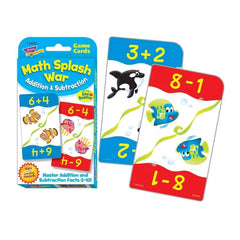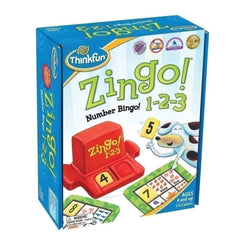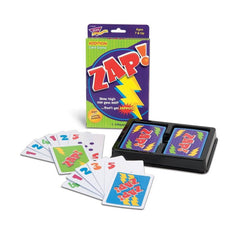Your Cart is Empty
Kindergarten & First Grade Math Games
This post was updated on April 18, 2024.
Supporting Early Math at Home
Kindergarten and First Grade
Learning at home should ALWAYS be fun – at least when children are young. Four year-olds are little sponges and so happy and proud to accomplish new things. (If only we could bottle that enthusiasm for exploring new topics without a fear of failure and pull it out in about 5 years!)
About the time children enter kindergarten parents start to look for ways to support formal math at home. By this time many children are “singing” their numbers to 20, but they are inconsistent with the one to one correlation of counting. They may count the fingers on their hand for example and say, “One, two, three four, five, six! There are six!”. The concept that units are a thing is a big developmental milestone. More than and less than is also a unique concept. Initially, they understand that I have two cookies and you have one – I want more!
Before starting kindergarten, it is great to fine tune their thinking so that they realize that 2 is more than one. Other simple real-life concepts begin to focus with numbers at this time, too. I have two cookies and you have one cookie – together we have three cookies. In kindergarten, students will begin to focus on the fact that there are symbols for all this interesting thinking.
2+3=5
Whether your child struggles with these new symbols as a way of thinking or adapts to it quickly, it is a good idea to talk about, demonstrate, and practice what they are learning at school. The more you can show them real life example, the easier it will be for them. Remember, it should always be fun – never forced.
Math Games
Games are a great way to teach lots of skills. I have a trifecta that I recommend for kindergarten and first grade math. They are: Zap, Math Splash War, and Zingo 1-2-3
Each of these games approaches simple adding and subtracting in a slightly different way. Together they provide the right amount of variety to be fun and solidify the child’s math facts.
The object of the game is to collect the most cards using single digit addition and subtraction skills. Two players split the deck and place their cards face down on the table. At the same time, both players turn over one card. Each card contains a simple single digit math problem. The player with the highest value on their card collects those cards. You play until there are no cards left. In this game there is an element of luck (what cards you started with and the order they are played). This keeps the game fun, but both players will do the mental math to know which card has the highest value.
Bonus: Shuffling, dealing and holding playing cards are all learned skills that build fine motor skills. Show them how and let them try!
WINNER! 2010 Oppenheim Toy Portfolio Gold Seal Award, 2010 National Parenting Center Seal of Approval
This Bingo style game is great because the children can play it alone or with a few friends. They can play it independently or with direct supervision. This is also great for coaching from across the room while you are folding laundry or doing the dishes.
The object of the game is to fill your Bingo card using the number chips that emerge from the Zingo device. The device itself is easy to use, durable AND it stores the chips when you are finished playing! (We have never had one returned broken.)
There are two sides to each Bingo card. A card with images to match to the number on the tile and the reverse side that has simple math problems to be matched to the appropriate number tile. When it is their turn, the player simply pushes the device back and forth revealing a new tile. If the tile matched their card, they place it over the matching picture. If there is no match the turn moves to the next player. When the card is full they start over.
If you like this idea, there is also ZINGO Word Builder that build 3 letter words – also great for this age group.
Zap is the hardest of the three games. It will involve multi-digit addition. Multiple players can play Zap. The winner is the player who collects the highest score after a set number of turns. To play, one person at a time, turns over one card at a time, verbally adding the number that appear on the cards 2+3=5+2=7 and so on. They player may stop at any time and write down their score. It is then the next players turn. If a player turns over a Zap card their score is automatically zero. If they turn over a Double Zap they lose their entire score! You can vary the rules to adjust for the sophistication and skill of the players. Remove the Zap and Double Zap cards or have every payer maintain their own score sheet or have one play do all the addition work as the score keeper. This game is fun because the pressure is off - the best mathematician does not always win! The players will be doing mental math well into the double digits. Addition only.
These are three educational games that the children love to play and will reinforce math skills across the board. Generally speaking, if your child is struggling with math, weave it into conversation everywhere you can.
Here are a few everyday examples:
Time: Five minutes until we leave, 4 minutes, 3 minutes – okay we only have two minutes left, let’s put your coat on!
Getting Dressed: Count the buttons as you go. Count their shoes. Count the patterns in the fabric.
Snack Time: Build math problems with their food. You have 5 grapes. Can you count them. Oops! I ate one. Now how many do you have?
In the Car: Count how many trucks. Dogs? Play "I Spy" in the car. I see two blue things. What are they? Yes, you guessed it! Your shoes!
OR
I will give you a problem to do. ”What is 2 + 3?” Yeah! When they are ready, ask, ”Would you like a third grade problem?!” Then say very slowly, so they have time to process, “What is 2+2+2?” Give them time to process each step one at a time and then say, “YES! You did it! That is third grade math! Oh my goodness! You are amazing!”
Make it fun! Enjoy the time and celebrate as you see progress. Praise them for that really awesome math they are doing!















Leave a comment
Comments will be approved before showing up.